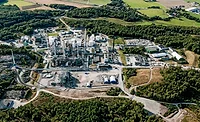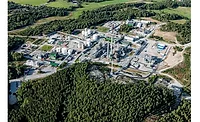Perstorp Explores Project to Produce Recycled Methanol
MALMO, Sweden — Specialty chemicals provider Perstorp is investigating the potential production of recycled methanol, using carbon dioxide and residual streams, at its facility in Stenungsund, Sweden. The Swedish Energy Agency (SEA) will partly finance the feasibility study.
Methanol is one of Perstorp’s major raw materials, used to produce polyols and formates, the building blocks of many consumer goods such as coatings and paints, composite materials, detergents, adhesives, cosmetics, and synthetic lubricants. Methanol is also used for Perstorp’s next-generation, phthalate-free plasticizer, Pevalen™.
Industrially, methanol is mainly produced from fossil materials like natural gas or coal. This project not only aims to reduce process-related carbon dioxide emissions but, at the same time, produce a more sustainable, recycled methanol to replace fossil methanol as a raw material in Perstorp’s production. The methanol would, for example, be used in Perstorp’s renewable, pro-environment products and solutions.
Funding from the Swedish Energy Agency is helping Perstorp undertake the feasibility study that will evaluate the concept, which would include a new plant, the integration of raw materials, fuel, energy and residual streams, and new logistical solutions for the methanol.
If successful, the methanol project will significantly support Perstorp’s goal of contributing to a sustainable society. In 2017, the company announced its ambition to become finite material neutral, which, in part, means shifting from using finite, fossil raw materials to renewable, reused or recycled ones.
Perstorp’s President and CEO, Jan Secher, said, “We have taken on a tough sustainability ambition. This methanol project is a development that supports the growing global demand from end consumers and brand owners for more sustainable products and materials. In the chemical industry, Perstorp is a leader in this transition, and we are proud to have the support of the SEA in developing this important and innovative project.”
Looking for a reprint of this article?
From high-res PDFs to custom plaques, order your copy today!






